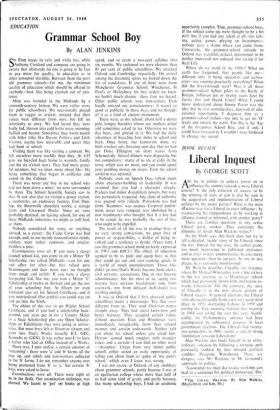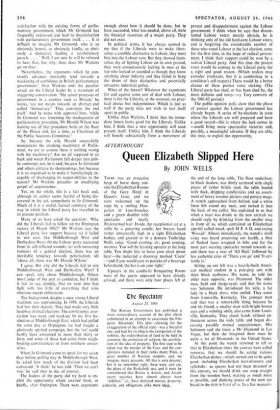Liberal Inquest
BOOK REVIEW
By GEORGE SCOTT
As the blurb says, this book does not try to tell a detailed, 'inside' story of the Liberals since the war. Indeed. for my taste, the author grants too much importance to published utterances and to other writers' commentaries; he asks many more questions than he answers. In one or two places, he is curiously misinformed.
Mr Watkins describes Cheadle, for instance, where Dr Michael Winstanley won a fine victory in the last election, as 'a Manchester suburb which had previously shown little inclination to- wards Liberalism.' On the contrary, the story of Cheadle is in the now classic pattern of Liberal success. At general elections, the Liberal vote advanced rapidly from a not very good third place in 1955. overtaking Labour in 1959 and cutting the Tory majority, halving that majority in 1964 and taking the seat this year. Signifi- cantly, the Parliamentary advance had been accompanied by substantial progress in local government elections. The Liberals had twenty- two councillors in 1966—surely a sign of strong `inclination' towards Liberalism?
Alan Watkins also lands himself in an extra- ordinary situation by following a tortuous path previously trodden by that intrepid political rambler, Peregrine Worsthorne. There are dangers, says Mr Watkins, in Mr Grimond's approach to politics.
`A contempt for their day-to-day workings can, lead to a contempt for political democracy. Dis-' * THE LIBI RAL DILEMMA. By Alan Watkins.
(MacGibbon and Kee, 30s.) satisfaction with the existing forms of parlia- mentary government, which Mr Grimond has frequently expressed, can lead to dissatisfaction with parliamentary government itself. . . . It is difficult to imagine Mr Grimond, who is so obviously honest, so obviously kindly, so obvi- ously a democrat, leading a revolutionary putsch. . . . ' Well, I am sure Jo will be relieved to hear that, but why, then, does Mr Watkins go on thus: 'Nevertheless, the arguments which he con- stantly advances inevitably tend towards a weakening of confidence in British parliamentary government.' Alan Watkins ends his peculiar attack on the Liberal leader by a statement of staggering conservatism. 'The actual processes of government in a country such as Britain,' he writes, 'are not means towards an abstract end called "democracy." They constitute the end itself.' And he notes with approval how, 'while Jo Grimond was lamenting the inadequacies of parliamentary procedure, Mr Harold Wilson was making use of that procedure both on the floor of the House and, for a time, as Chairman of the Public Accounts Committee.'
So, because the wily Harold successfully manipulates the creaking machinery of Parlia- ment, we are to assume there is nothing wrong with the machinery? Are we all supposed to sit back and watch Parliament fall deeper into pub- lic contempt, not, be it said, because Jo Grimond and others criticise its shortcomings, but because it is so organised as to make it humiliatingly in- capable of discharging its responsibilities to the nation? Mr Watkins preaches an unedifying gospel of acquiescence.
Yet, on the whole, this is a fair book and, although its author seems fearful of being dis- covered in the act, sympathetic to Jo Grimond. Much of it is a useful, factual summary of the way in which the Liberal party has travelled to its present position.
Many of us have asked the question : 'Why did the Liberals fail to follow up the Orpington victory of March 1962?' Mr Watkins says the Liberal party lost support because (a) it failed to win seats like Middlesbrough West and Derbyshire West; (b) the Labour party recovered from its self-inflicted wounds; (c) with increasing rumours of a general election, there was an inevitable tendency towards polarisation; (d) 'above all, there was Mr Harold Wilson.'
I agree. But why did the Liberals fail to win Middlesbrough West and Derbyshire West? I can speak only about Middlesbrough. Others must judge of my part as candidate, but I think it fair to say, crudely, that we went into that fight with too little of everything that wins elections except enthusiasm.
The background, despite a once strong Liberal tradition, was unpromising. In 1959, the Liberals had lost their deposit. They had made very little headway in local elections. The constituency asso- ciation was weak and hard-up. In my first by- election at Middlesbrough East, which had polled the same day as Orpington, we had fought a gloriously spirited campaign, but the 'we' could hardly have amounted to more than thirty or forty and some of those had come from neigh- bouring constituencies or from northern univer- sities.
When Jo Grimond came to speak for me seven days before polling day in Middlesbrough West, he asked how much of the division had been canvassed. 'A third,' he was told. 'Then we can't win,' he said (not to me, of course).
The leaders of the party did try hard to ex- ploit the opportunity which awaited them, so briefly, after Orpington. There were arguments enough about how it should be done, but to have succeeded, what was needed, above all, were the financial resources of a major party. They did not exist.
In political terms, it has always seemed to me that if the Liberals were to make them- selves a credible alternative to Labour, they must bite into the Labour vote. But they showed them- selves shy of fighting Labour on its own ground, they were conspicuously lacking in men at the top who looked or sounded as though they knew anything about industry and they failed to bang the drum of their distinctive and potentially attractive industrial policy.
What of the future? Whatever the arguments for and against some sort of deal with Labour, there is for the Liberals, at the moment, no prac- tical choice but independence. Which is just as well if the party does not wish to tear itself apart in public.
Unlike Alan Watkins, I think that the imme- diate future looks good for the Liberals. Unlike him, I think that a new opportunity will soon present itself. Unlike him, I think the Liberals will benefit substantially from a movement of protest and disappointment against the Labour government. I think when he says that discon- tented Labour voters merely abstain, he is thinking only of the old hard-core Labour voters and is forgetting the considerable number of those who voted Labour at the last election, some for the first time, in the hope of radical govern- ment. I think their support could be won by a radical Liberal party. And this time the protest votes would be coming to the Liberal party for a right and good reason. (Which realists may consider irrelevant, but it is comforting to a candidate's self-respect.) There would be a better chance of these protest votes sticking. (The Liberal party has shed, or has been shed by, the more dubious and temporary Tory converts of the 1961-62 period.) The public opinion polls show that the phase of protest against the Labour government has already begun. A series of by-elections in seats where the Liberals are well prepared and have a good record—this is where the luck comes in —could bring more spectacular victories and, possibly, a meaningful advance. If they are able, this time, to exploit the opportunity.































 Previous page
Previous page